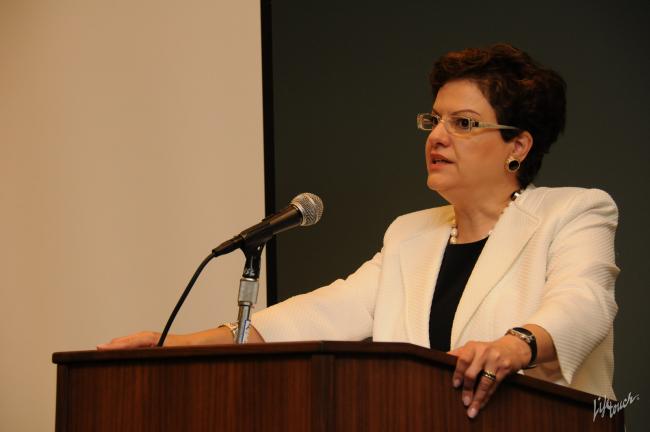Minority Majority: Impact on Assessments
By Jason Bengs Communicator July 2015, Volume 38, Issue 11
By Jason Bengs
Communicator
July 2015, Volume 38, Issue 11
 Districts around the country are facing an unprecedented shift in demographics. Take for example the fact that students speak 800 different languages in New York City schools. The impact of new “minority majorities,” especially as it relates to accurately assessing of English-language learners are issues that framed Yvette Donado’s session at NAESP’s recent annual conference in Long Beach, California. Donado, who is the senior vice president and chief administrative officer of the Educational Testing Service (ETS) has spearheaded ETS’s initiative to address the needs of English-language learners.
Districts around the country are facing an unprecedented shift in demographics. Take for example the fact that students speak 800 different languages in New York City schools. The impact of new “minority majorities,” especially as it relates to accurately assessing of English-language learners are issues that framed Yvette Donado’s session at NAESP’s recent annual conference in Long Beach, California. Donado, who is the senior vice president and chief administrative officer of the Educational Testing Service (ETS) has spearheaded ETS’s initiative to address the needs of English-language learners.
Donado explained that because of the rapid change in demographics, accurate assessment can be difficult. In some districts, English learners are often mistakenly identified as special needs students. This can devastate a student who is already struggling and can set back the language acquisition process. Along with this assessment problem, there is also a raging debate on how we provide equitably for the needs of all students.
Donado highlighted the impact that many of the current reform initiatives are having on schools. She believes that for profit charters, voucher systems, and private schools have further compounded the issues by transplanting more of the affluent students to higher performing schools. The end result is an increase in the number of “second class” citizens. This will result in a circle of poverty that will only increase over time. According to Donado, principals should address these challenges, providing a well-rounded education for all students by following these strategies.
- Know who you serve and how best to reach them. If many of your parents are working two jobs, they probably are not able to come to activities at the school during traditional times. To engage families, consider offering activities on weekends.
- Strive to be inclusive. Don’t immediately assume that families don’t want to be involved in their children’s learning. Instead, create every opportunity to involve them. Also make sure all groups are represented or heard on decisions. Boards should accurately reflect the communities they serve.
- Find ways to connect students with experts in the field—degreed professionals—who come from the same background. Many students think that it is impossible to rise above their circumstances; they need models that have succeeded at doing that.
Jason Bengs is principal of Southwest Elementary in Clinton, Oklahoma.
Visit NAESP’s Conference News Archives to see more highlights from this year’s conference.
—
Copyright © 2015. National Association of Elementary School Principals. No part of the articles in NAESP magazines, newsletters, or website may be reproduced in any medium without the permission of the National Association of Elementary School Principals. For more information, view NAESP’s reprint policy.

